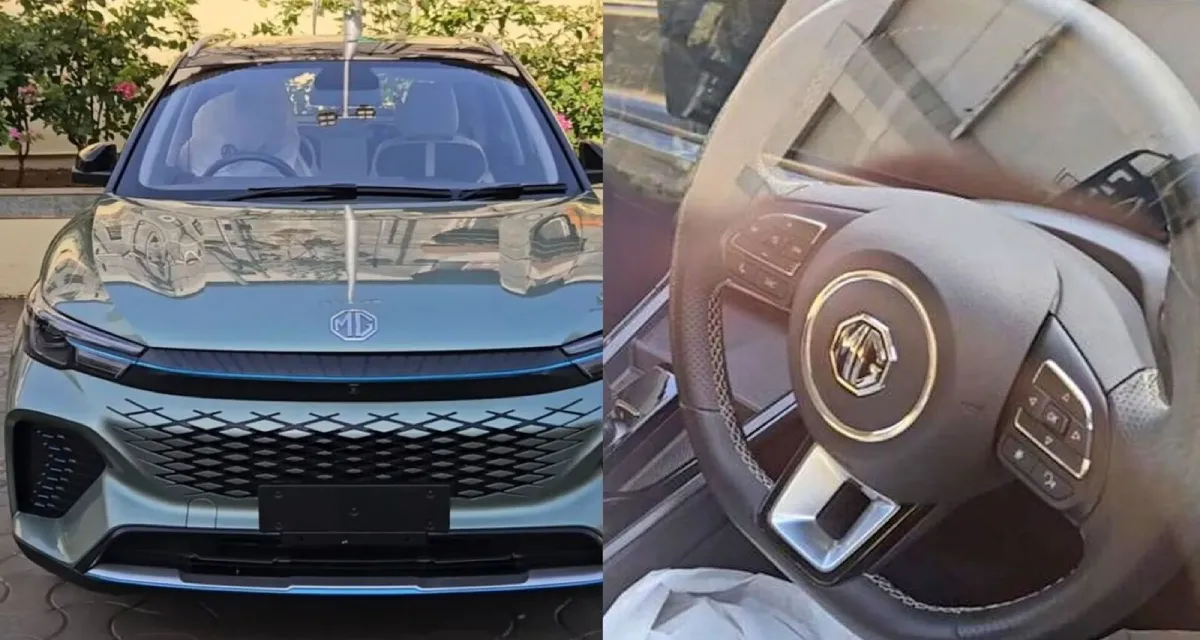
New MG Astor Facelift Unveiled Globally: Major Design Overhaul, Hybrid Powertrain, and Advanced Features Expected for India

New MG Astor Facelift Unveiled Globally: Major Design Overhaul, Hybrid Powertrain, and Advanced Features Expected for India
MG Motor has unveiled the refreshed MG Astor, known globally as the MG ZS, with significant updates to its design, interior, and powertrain. The global reveal of this updated compact SUV hints that the India-spec Astor could soon receive a facelift, considering that the model has remained unchanged since its launch three years ago. Here’s what the facelifted Astor offers and what Indian buyers can expect from this potential update.
The new MG Astor flaunts a more aggressive and modern design language compared to the current model available in India. The front fascia features a large honeycomb-patterned grille flanked by sleek, swept-back headlights with connected LED DRLs. The aggressive styling extends to the bumper, with C-shaped air intakes on either side and a silver skid plate enhancing its sporty appeal. Another notable change is the repositioning of the MG logo on the bonnet, giving it a more premium touch.
The side profile of the updated Astor remains largely similar to the current model but gets new alloy wheel designs and a silver-coloured trim along the body cladding, adding to its visual appeal. At the rear, the facelifted Astor gets a redesigned bumper with silver accents that mimic a dual-exhaust look, new wraparound LED tail lights, and a lower-positioned rear fog lamp. Overall, the refreshed design gives the Astor a more dynamic and sophisticated presence on the road.
Step inside, and the new MG Astor boasts a thoroughly revamped cabin. The dashboard now houses a larger 12.3-inch touchscreen infotainment system, and the hexagonal AC vents have been redesigned to complement the sleek interior layout. The steering wheel is also new, featuring a flat-top and flat-bottom design, adding a sporty flair to the SUV's interior.
Key features include wireless Android Auto and Apple CarPlay, a vertically-stacked wireless phone charger, automatic climate control with rear AC vents, and a 6-way adjustable driver’s seat. The facelifted model also comes with heated front seats and a heated steering wheel, catering to comfort and convenience.
On the safety front, MG has left no stone unturned. The facelifted Astor comes equipped with six airbags, a 360-degree camera, an electronic parking brake with auto-hold, a tyre pressure monitoring system (TPMS), and level-2 Advanced Driver Assistance Systems (ADAS). ADAS features include forward collision mitigation and driver drowsiness detection, enhancing the vehicle's safety quotient.
One of the most significant updates to the MG Astor is the introduction of a hybrid powertrain in global markets. While the India-spec Astor currently offers 1.3-litre turbo-petrol and 1.5-litre naturally aspirated petrol engines, the hybrid variant could be a game-changer for MG in India as the brand pushes for greener mobility solutions. The hybrid powertrain, available internationally, delivers 196 PS of power and 465 Nm of torque, offering a significant performance boost over the current engines in the Indian lineup.
With the facelift, the MG Astor is expected to be priced higher than the current model, which ranges from Rs 9.98 lakh to Rs 18.08 lakh (ex-showroom). If launched in India, the refreshed Astor will continue to compete with popular compact SUVs like the Hyundai Creta, Maruti Grand Vitara, Kia Seltos, Volkswagen Taigun, and Honda Elevate.
The updated MG Astor promises to bring a fresh design, advanced technology, and an efficient hybrid powertrain, making it a strong contender in the compact SUV segment in India. As MG gears up for greener mobility solutions, the facelifted Astor could be a crucial step toward their goal.
Also Read: